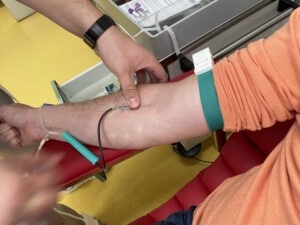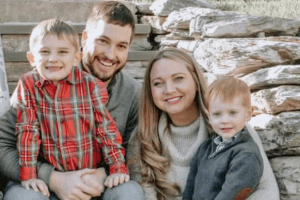Medicine has a truth problem. In the era of social media and heavily politicized science, “truth” is increasingly crowdsourced: if enough people like, share, or choose to believe something, others will accept it as true.

This way of determining “truth” doesn’t involve scientific methods; it relies instead on “the wisdom of crowds,” which has particular power in a democratic society in which leaders and policies are chosen by the will of the group. Such choices anchor concepts like freedom and liberty. But they may not be helpful in determining whether a building will collapse, whether your brakes will stop your car — or whether a medication or vaccine works.
Growing allegiance to crowd-endorsed “facts” poses a serious challenge for the institutions and structures that the medical enterprise has developed to protect the public and ensure that people can tell who can or cannot be trusted as medical professionals or relied on for scientific knowledge. These structures include comprehensive medical education, licensure, and board certification, and leaders in all these areas are struggling to figure out how to respond to assertions by doctors on social media that are not supported by evidence and may harm patients. The Surgeon General has identified medical misinformation as a major public health threat, and many professional societies, including the American Medical Association, have called for action to combat it.
The issue of what physicians can and cannot say on social media has been hotly debated by legal scholars and in medical journals. Coleman has observed that “professional speech” is a legally contested domain between speech that can be regulated or prohibited by licensing boards and speech protected by the First Amendment. It is also unclear when physicians’ speech on social media constitutes “medical practice.” Mello has questioned why First Amendment protections should extend to harmful speech that leads to death from preventable disease when some other forms of speech — such as fraudulent commercial speech, which may be less harmful — are prohibited.
Certifying boards — private, nongovernmental, nonprofit organizations created by the profession to issue voluntary credentials for specialist physicians — are well placed to help address the problem of false information on social media. Though many health care institutions have chosen to mandate board certification as a credential for employment, certification — unlike a state license — is not legally required in order to practice medicine anywhere in the United States. Becoming certified by the American Board of Internal Medicine (ABIM), the largest board, in internal medicine, or one of 21 subspecialties requires passing an exam. And to maintain their certificate, physicians must take and pass exams over the course of their career to demonstrate that they’ve kept their knowledge current. This requirement helps ensure that physicians are practicing evidence-based medicine supported by the latest peer-reviewed research, with a goal of protecting patient well-being and safety.
Creating these exams involves bringing together academic and practicing expert clinicians from a particular field to write and critique multiple-choice questions that have a single best answer — a process that may provide a useful perspective on somewhat analogous efforts to assess the information that doctors and others disseminate through informal public channels such as social media. The challenge in writing multiple-choice exam questions is not constructing a question with a right answer; rather it’s creating the “distractors,” the wrong but plausible answers. As anyone who has taken a multiple-choice exam knows, even someone with no knowledge of the relevant field can pass a test when the wrong answers are obviously implausible. An exam question measures something important only if someone acquainted with the field might believe the wrong answers are correct. The expert clinicians spend most of their time debating the distractors: Is that answer really wrong? If anyone around the table can find a valid article that might support the choice of option C as correct, then option C can’t be used as a distractor. In these discussions, the experts are guided by peer-reviewed medical literature, not by “prevailing opinion” or what a committee member believes; they don’t take polls. They accept the methods underlying scientific studies as a safer guide to practice than the received wisdom, intuition, or even “democratic process.” Informed by that literature, they conclude that some answers are definitively wrong.
On July 29, 2021, the Federation of State Medical Boards (FSMB), the umbrella organization of state and territorial licensing boards, issued a policy statement that “Physicians who generate and spread COVID-19 vaccine misinformation or disinformation are risking disciplinary action by state medical boards, including the suspension or revocation of their medical license.” In September, the ABIM, along with our colleagues at the American Board of Pediatrics and the American Board of Family Medicine, issued a statement supporting the FSMB’s position, saying, “We all look to board-certified physicians to provide outstanding care and guidance; providing misinformation about a lethal disease is unethical, unprofessional and dangerous.” Also in September, the Tennessee Board of Medical Examiners adopted a policy echoing that of the FSMB, which prompted the Tennessee state legislature to pass a law in November prohibiting the licensing board from taking disciplinary action against any doctor for any treatment offered to a patient with Covid. Similar laws are now under consideration in 24 other states.
The ABIM has long had a policy that unprofessional or unethical behavior can lead to the revocation of an ABIM certificate. In October, we issued a policy statement making clear that “Providing false or inaccurate information to patients or the public is unprofessional and unethical, and violates the trust that the profession of medicine and the public have in ABIM Board Certification. Therefore, such conduct constitutes grounds for disciplinary sanctions.” After we made this statement, we received a number of reports alleging violations of this policy by specific physicians.
Because the credential has substantial importance to our diplomates, and because we always strive for fairness and deliberation, we have a robust disciplinary sanctions and appeals process, giving ample opportunity for physicians facing sanctions to tell their side of the story and to be represented by counsel. We have used this process over the years in response to various cases of unprofessional and unethical conduct, including cheating and criminal and other activity by physicians that may or may not have triggered disciplinary action by state licensing boards. The process sometimes results in the ABIM’s temporarily or permanently rescinding certification after review and consideration by panels composed of members of our professional staff and the physician’s peers. We have faced — and continue to be engaged in — expensive litigation, defending the integrity of our process in court against various legal challenges. The courts have supported our right to make judgments about the certification status of physicians to whom we grant the credential.
As the ABIM confronts the danger of medical misinformation, we recognize that there are many clinical issues on which physicians legitimately hold a spectrum of opinions, all supported by evidence; such justifiable positions would not make it as “distractors” on our exam, nor would they meet our definition of “false information,” as determined by experts consulting the literature.
A whole range of statements with which many — or even most — physicians might disagree would therefore not trigger our disciplinary process. On the other hand, when someone certified by the ABIM says something like “the origin of all coronary heart disease is a clearly reversible arterial scurvy” or “children can’t spread Covid” or “vaccines don’t prevent Covid deaths or hospitalizations,” we are not dealing with valid professional disagreement; we are dealing with wrong answers.
With nearly 1 million Americans dead from Covid, and deaths — some of them clearly preventable — continuing at a rate of more than 200,000 per year, it has become imperative for our profession to empower our institutions to signal clearly who is — and who is not — providing evidence-based information. We, physicians, need to use the institutions we’ve created for professional self-regulation to maintain public trust by establishing some recognizable boundaries.
There aren’t always right answers, but some answers are clearly wrong.
Richard J. Baron, M.D., and Yul D. Ejnes, M.D.





































